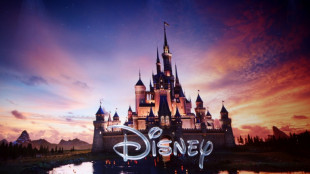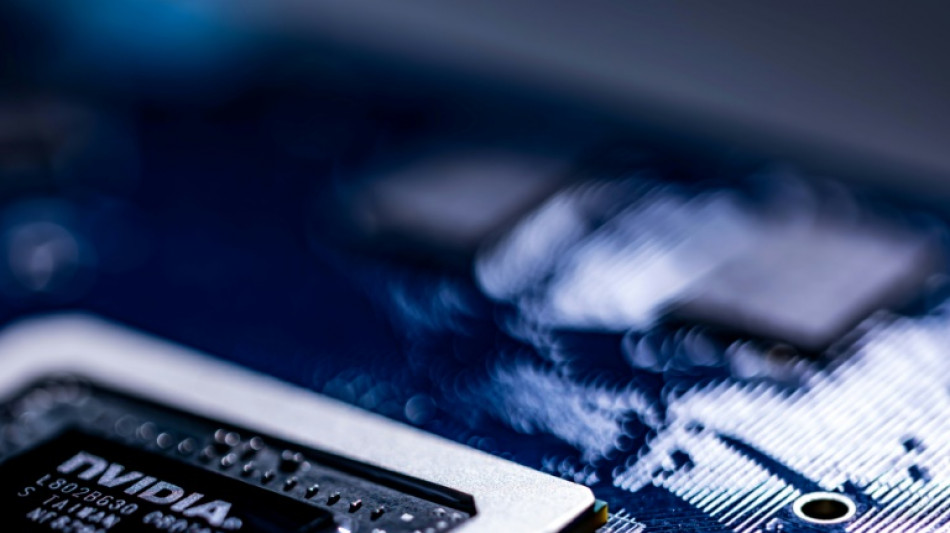
-
 'Magic' Jalibert guides Bordeaux-Begles past Scarlets
'Magic' Jalibert guides Bordeaux-Begles past Scarlets
-
Teenage pair Ndjantou and Mbaye star as PSG beat Metz to go top

-
 Anglo-French star Jane Birkin gets name on bridge over Paris canal
Anglo-French star Jane Birkin gets name on bridge over Paris canal
-
US troops in Syria killed in alleged IS ambush

-
 Jalibert masterclass guides Bordeaux-Begles past Scarlets
Jalibert masterclass guides Bordeaux-Begles past Scarlets
-
M23 marches on in east DR Congo as US vows action against Rwanda

-
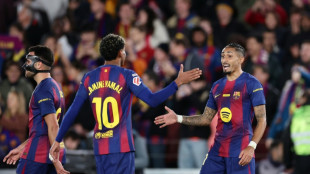 Raphinha double stretches Barca's Liga lead in Osasuna win
Raphinha double stretches Barca's Liga lead in Osasuna win
-
Terrific Terrier returns Leverkusen to fourth
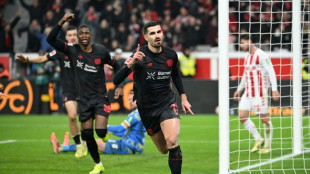
-
 Colts activate 44-year-old Rivers for NFL game at Seattle
Colts activate 44-year-old Rivers for NFL game at Seattle
-
US troops in Syria killed in IS ambush attack

-
 Liverpool's Slot says 'no issue to resolve' with Salah after outburst
Liverpool's Slot says 'no issue to resolve' with Salah after outburst
-
'Stop the slaughter': French farmers block roads over cow disease cull

-
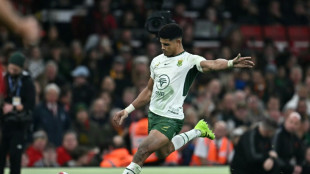 Stormers see off La Rochelle, Sale stun Clermont in Champions Cup
Stormers see off La Rochelle, Sale stun Clermont in Champions Cup
-
Maresca hails Palmer as Chelsea return to winning ways against Everton

-
 Hungarian protesters demand Orban quits over abuse cases
Hungarian protesters demand Orban quits over abuse cases
-
Belarus frees protest leader Kolesnikova, Nobel winner Bialiatski

-
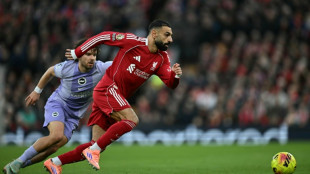 Salah sets up goal on return to Liverpool action
Salah sets up goal on return to Liverpool action
-
Palmer strikes as Chelsea return to winning ways against Everton

-
 Pogacar targets Tour de France Paris-Roubaix and Milan-San Remo in 2026
Pogacar targets Tour de France Paris-Roubaix and Milan-San Remo in 2026
-
Salah back in action for Liverpool after outburst

-
 Atletico recover Liga momentum with battling win over Valencia
Atletico recover Liga momentum with battling win over Valencia
-
Meillard leads 'perfect' Swiss sweep in Val d'Isere giant slalom

-
 Salah on Liverpool bench for Brighton match
Salah on Liverpool bench for Brighton match
-
Meillard leads Swiss sweep in Val d'Isere giant slalom

-
 Indonesia flood death toll passes 1,000 as authorities ramp up aid
Indonesia flood death toll passes 1,000 as authorities ramp up aid
-
Cambodia shuts Thailand border crossings over deadly fighting

-
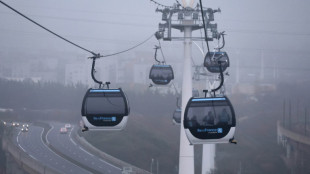 First urban cable car unveiled outside Paris
First urban cable car unveiled outside Paris
-
Vonn second behind Aicher in World Cup downhill at St Moritz

-
 Aicher pips Vonn to downhill win at St Moritz
Aicher pips Vonn to downhill win at St Moritz
-
Thailand says 4 soldiers killed in Cambodia conflict, denies Trump truce claim

-
 Fans vandalise India stadium after Messi's abrupt exit
Fans vandalise India stadium after Messi's abrupt exit
-
Women sommeliers are cracking male-dominated wine world open

-
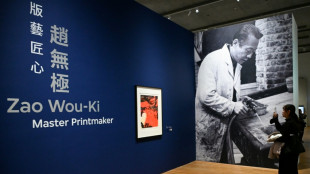 Exhibition of Franco-Chinese print master Zao Wou-Ki opens in Hong Kong
Exhibition of Franco-Chinese print master Zao Wou-Ki opens in Hong Kong
-
Myanmar junta denies killing civilians in hospital strike

-
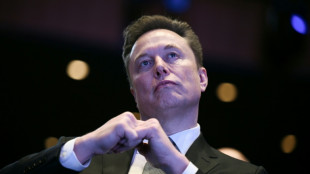 Why SpaceX IPO plan is generating so much buzz
Why SpaceX IPO plan is generating so much buzz
-
Thailand continues Cambodia strikes despite Trump truce calls

-
 US envoy to meet Zelensky, Europe leaders in Berlin this weekend
US envoy to meet Zelensky, Europe leaders in Berlin this weekend
-
North Korea acknowledges its troops cleared mines for Russia
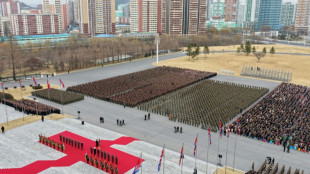
-
 US unseals warrant for tanker seized off Venezuelan coast
US unseals warrant for tanker seized off Venezuelan coast
-
Cambodia says Thailand still bombing hours after Trump truce call

-
 Machado urges pressure so Maduro understands 'he has to go'
Machado urges pressure so Maduro understands 'he has to go'
-
Leinster stutter before beating Leicester in Champions Cup

-
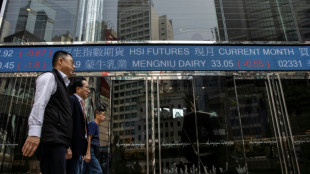 World stocks mostly slide, consolidating Fed-fuelled gains
World stocks mostly slide, consolidating Fed-fuelled gains
-
Crypto firm Tether bids for Juventus, is quickly rebuffed

-
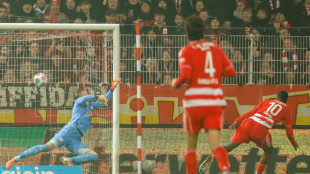 Union sink second-placed Leipzig to climb in Bundesliga
Union sink second-placed Leipzig to climb in Bundesliga
-
US Treasury lifts sanctions on Brazil Supreme Court justice

-
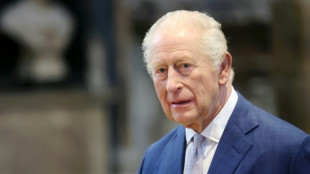 UK king shares 'good news' that cancer treatment will be reduced in 2026
UK king shares 'good news' that cancer treatment will be reduced in 2026
-
Wembanyama expected to return for Spurs in NBA Cup clash with Thunder

-
 Five takeaways from Luigi Mangione evidence hearings
Five takeaways from Luigi Mangione evidence hearings
-
UK's king shares 'good news' that cancer treatment will be reduced in 2026
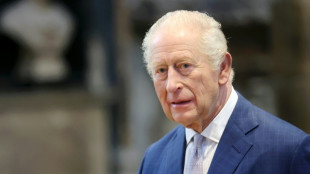

Competition heats up to challenge Nvidia's AI chip dominance
The artificial intelligence (AI) revolution has whetted the appetites of Nvidia's competitors, who are seeking to close the gap on the chip giant, which has so far been the central playmaker in the AI revolution.
Virtually unknown to the general public just three years ago, Nvidia now boasts the world's highest revenues, driven by sales of its graphics cards -- or GPUs (graphics processing units) -- the processors that are key to building the technology behind ChatGPT and its rivals.
- Why does Nvidia dominate? -
While it was not the first to develop GPUs, the California-based group made them its specialty starting in the late 1990s, at the very beginning of cloud computing, and thus has unique experience in the field.
Moreover, Nvidia is "a three-headed dragon," as Dylan Patel, head of consultancy SemiAnalysis, recently put it on the "No Priors" podcast.
It does not just design chips, but offers an entire infrastructure capable of making them work together with networking and software -- the dragon's two other heads.
Nvidia can "satisfy every level of need in the datacenter with world-class product," according to Jon Peddie of Jon Peddie Research.
- Where is the competition? -
At a considerable distance from Nvidia, whose market share is estimated at roughly 80 percent depending on the source, American firm AMD had until now been considered the runner-up.
But AMD generates the bulk of its revenue from CPU sales -- processors used for personal and business computers that are less powerful than GPUs -- and "can't divert resources from that golden egg," Peddie believes.
Determined to reduce their dependence on Nvidia, the major cloud providers have developed their own processors.
Google began using its Tensor Processing Unit (TPU) a decade ago, while Amazon Web Services (AWS)'s Trainium, the cloud-dedicated subsidiary, appeared in 2020.
Today, Google and Amazon account for more than 10 percent of the market and have even overtaken AMD in terms of "performance, pricing, usability, reliability, and ability to produce enough chips to satisfy the biggest customers," argued Jordan Nanos of SemiAnalysis.
Google is even offering its chips to third-party customers, according to several media reports. Contacted by AFP, it did not respond. Amazon, however, does not sell its Trainium to other players.
- Where do the Chinese stand? -
The only nation rivaling the United States in the sector, China is seeking to make up for lost time -- and is having to do so without the most advanced US chips, which are now subject to export restrictions.
For Nanos, Huawei ranks among Nvidia's most credible competitors, alongside Google or Amazon, and ahead of AMD.
Like Google and Amazon, their Chinese equivalents Baidu and Alibaba are also now having their own AI processors manufactured, though these remain merely substitutes for Nvidia's GPUs.
"They can't catch up technically for a while using in-country" fabrication facilities, said Peddie.
But "over time, with its huge and smart workforce, and subsidized investment, China will be able to make state-of-the-art fabrication systems."
- Is Nvidia under threat? -
No expert sees the Santa Clara, California, giant loosening its grip on the sector in the near future.
"Nvidia underpins the vast majority of AI applications today," notes John Belton, analyst at Gabelli Funds. "And despite their lead, they keep their foot on the gas by launching a product every year, a pace that will be difficult for competitors to match."
In early September, Nvidia announced that its new generation, Rubin, would be commercialized in late 2026, with performance for AI functions estimated at 7.5 times that of its flagship product currently on the market, Blackwell.
J.AbuShaban--SF-PST



